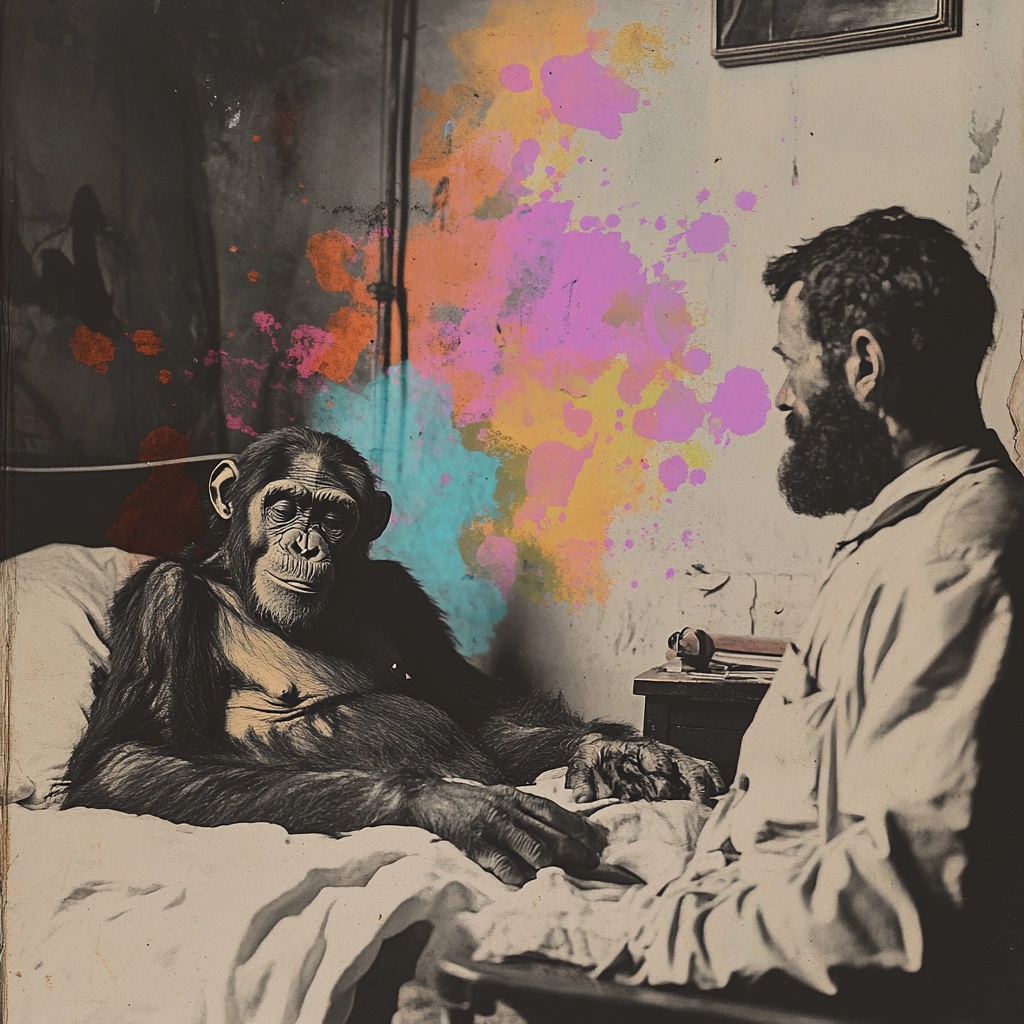YZUR (5)
By:
September 30, 2025

Inspired no doubt by Richard Lynch Garner’s widely publicized 1900 study Apes and Monkeys: Their Life and Language, Lugones’ proto-sf story about the secret of chimpanzee intelligence (and the cruelty of science) was first published in the author’s 1906 collection Las Fuerzas Extrañas (Strange Forces). Translation by Carlos Costa and Georges Dodds for ERBzine.com. HiLoBooks is pleased to serialize an excerpt for HILOBROW’s readers.
ALL INSTALLMENTS: 1 | 2 | 3 | 4 | 5.
I began very slowly, asking him to pronounce the letters he could pronounce. Nothing! I left him alone for some hours, spying on him through a peep-hole in the partition. Nothing! I spoke to him with brief sentences, trying to reach his loyalty or his gluttony. Nothing! When those words were sad, his eyes would well up with tears. When I spoke to him a phrase that he already knew, such as “I am your Master,” with which I usually began all my lessons, or “You are my monkey” to complete my previous statement, to inspire a confidence in the complete truth of my statements, he acknowledged by closing his eyelids, but he neither gave out a sound, nor even moved his lips.
He had resumed making gestures as the sole means of communicating with me; and this adding to his analogy to the deaf-mute, redoubled my preoccupations, because nobody can ignore the great predisposition of the latter to mental diseases. At times I wished that he might go crazy, to see if the associated nervous excitement would break his silence. His convalescence remained unchanged, he showed the same sadness. It was evident that this was a sickness of the mind and spirit. The organism had collapsed under the impulse of an abnormal use of the brain, and in a few days more or less, he would become a lost cause. Furthermore, in spite of the meekness that the progression of his convalescence brought on, his silence, that exasperating silence, cause of my desperation, did not yield. From some obscure font of habits petrified into instinct, his race had imposed its millenarian silence upon animals, fortifying an atavistic will at the very roots of its being. The ancient men of the forest, who were forced into silence and submission, that is to say, to intellectual suicide, by who knows what barbarian injustice, kept their secret: forest taboos developed in prehistoric abysses, but grown formidable through the immensity of time into in the monkey’s unconscious decision.
It was the misfortune of the anthropoids to have lagged behind in the evolution whose lead had been taken by humans, and who had in a dark, barbaric despotism doubtlessly overthrown the great families of quadrupeds from their arboreal dominion over their primitive Eden, winnowing their numbers, capturing their females to enslave their broods fresh from the maternal belly, instilling in the defeated anthropoid their impotence. These, in order to protect their mortal dignity, broke their one unfortunate bond with the enemy, that of the word, seeking salvation in the ultimate night of lower animality.
And what horrors, what horrible atrocities would the winners not have committed upon these half-beasts at a critical moment in evolution, so that this these, rather than being content with intellectual gift that was the paradisiacal fruit of the Bible, were resigned to giving up the claudication of their race, and the degradation of their breed to an equality with of the inferior creatures; to that retrogression which forever crystallized their intelligence in the gestures of an acrobatic automat; to that great cowardice of life that would eternally bend, as a symbol of their beastiality, the backs of the dominated, and reinforce those melancholic features that remains at heart of their nature.
Here I was, on the brink of success, when my bad humour had arisen from some great atavistic limbo. Across millions of years, the word, with its spell, had remained dormant in the ancient simian soul; but set against that temptation to violate the darkness of protective animality, were ancestral memory, which instilled an instinctive horror in the lower species, forming across eons and eons a powerful barrier.
Yzur began his death agony without losing consciousness. A sweet agony closed his eyes, his breathing weak, his weak pulse, a complete calm broken when, on occasion, he turned to me with a heartbreaking expression of eternity, with the expression of an old mulatto. And the last night, the night of his death, was when it happened, that extraordinary thing which led me to undertake this narrative.
I had slept by his side, overcome by the heat and the calm of the growing twilight, when I felt something suddenly grasp my wrist.
I woke up frightened. The monkey, with his eyes wide open, was definitively dying now, and his expression was so human, that it horrified me; but his hand, his eyes, drew me strongly towards him, such that I had to bend immediately to his face; and then, with his last sigh, the last sigh that crowned and simultaneously dashed my hopes, he spoke up — I am certain — and spoke in a murmur (how can one explain the tone of a voice that has remained speechless for ten thousand centuries) these words whose humanity reconciled our species:
— FRIEND, WATER, FRIEND, MY FRIEND …
RADIUM AGE PROTO-SF: “Radium Age” is Josh Glenn’s name for the nascent sf genre’s c. 1900–1935 era, a period which saw the discovery of radioactivity, i.e., the revelation that matter itself is constantly in movement — a fitting metaphor for the first decades of the 20th century, during which old scientific, religious, political, and social certainties were shattered. More info here.
SERIALIZED BY HILOBOOKS: James Parker’s Cocky the Fox | Annalee Newitz’s “The Great Oxygen Race” | Matthew Battles’s “Imago” | & many more original and reissued novels and stories.
